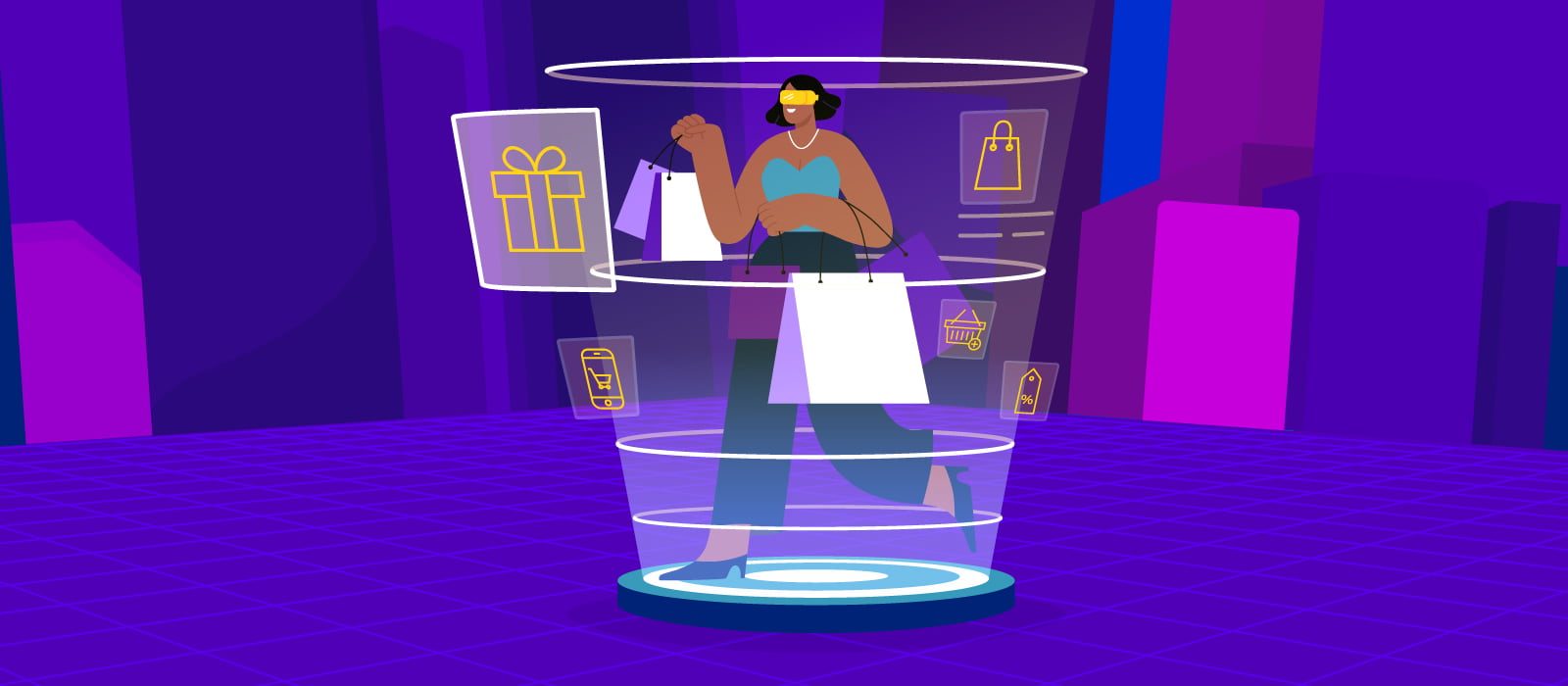The metaverse has opened a door to innovation in industries such as gaming and digital real estate. Now the technology looks set to upend the eCommerce domain too — but the question is how?
Over the past few months, the metaverse has emerged as a fascinating and extraordinary trend. The technology has seized the attention of celebrities, artists, athletes, brands, and business owners across the globe and established itself as a serious and powerful game-changer.
Huge sums of money are flowing into the metaverse and many enthusiasts, as well as domain experts, believe that the trend is bound to continue growing. Moreover, according to the statistics, by 2030 the global metaverse market is forecast to hit more than $1,607 billion and reach a revenue CAGR of 43.3%.
We have already seen some notable success stories concerning the metaverse in the gaming and digital real estate industries, including the development of outstanding metaverse-oriented platforms such as The Sandbox and Decentraland. However, the eCommerce sector can derive substantial benefits from the technology too, and undergo a remarkable transformation of its own.
Check out this article to get more insights regarding the metaverse in eCommerce, discover what monetization opportunities it offers to retailers, and find out which brands have already hopped aboard the digital bandwagon.
Brushing up on the basics of the metaverse
When metaverse technology first appeared on the horizon, it took all of us by surprise and everyone was asking one and the same question: “What is the metaverse, really?”. Even if you are already well-versed in it, it is worth letting us briefly explain the fundamentals. Then we will move on to more interesting stuff (we promise).
In simple terms, the metaverse is a graphically saturated virtual network representing interactive, real-time 3D spaces. The metaverse makes use of the most advanced technologies and services, including blockchain consulting, non-fungible tokens development, social commerce integration, augmented and virtual reality (AR and VR) integration, and many others.
The metaverse serves as a platform that allows us to play, work, study, shop, and hang out with others just like in real life. In particular, it zeroes in on the key idea of ‘presence’, meaning that users are supposed to feel as if they are really there in a given place, interacting with others.
As the metaverse evolves, it is likely to engage many other technologies and principles that will contribute to its even more effective functioning and enable a greater number of people to savor new experiences.
Read this article to learn about all the ins and outs of the metaverse
Before diving into the role of the metaverse in eCommerce, we recommend that you watch the video describing the most prominent metaverse cases. In it, our business analyst discusses the particular ways companies utilize this technology.
What is the current state of digital commerce?
It goes without saying that online shopping has made our lives much easier and now it is impossible to imagine our existence without it.
Importantly, eCommerce emerged as the savior during the pandemic era. It made previously conservative businesses go digital and offer their customers the opportunity to purchase their favorite products online without having to leave the sanctuary of their homes.
As many retailers are thinking about moving their businesses online, it is expected that the number of users in the digital commerce domain will amount to around 5,179 billion by 2026 which by any standard looks quite staggering.
Overview of the key challenges and issues of eCommerce
Even so, the eCommerce industry still has to deal with a number of challenges and tackle a range of imperfections. Retailers the world over are on the whole experiencing issues such as:
- Poor user engagement
- Low conversion rates
- High bounce rates
- Customers’ ever-increasing expectations
- Tough competition
- Customer retention
- Ineffective marketing campaigns
If any eCommerce business owner wishes to stay afloat and even come out on top, they need to urgently give due consideration to their most pressing pain points. Otherwise, they risk losing their customers and even damaging their reputations.
The metaverse as the solution to eCommerce dilemmas
![]()
The metaverse can help successfully tackle the majority of issues that eCommerce faces and, what’s more, can take the industry to a whole new level.
Even though the technology is still nascent, it already looks quite promising and is poised to put forward some major solutions to eCommerce problems. Below, we will take a closer look at how exactly the metaverse can shake up digital commerce.
The metaverse offers a personalized experience
Personalization in eCommerce is considered to be the cornerstone of success since it helps boost conversions and retain your customers. There are multiple statistics that demonstrate the importance of providing customers with a personalized approach and not treating them like numbers.
The metaverse, for its part, enables brands to introduce their customers to cool and highly personalized digital experiences. By making use of AR and VR tools, shoppers can have a better sense of the desired product. They can examine its details in more depth, look at it from different angles, rotate and zoom it in, see user reviews, and get advice on how to use it.
Emma Ridderstad, the CEO at Warpin, a Stockholm-based tech start-up that cooperates with brands such as H&M and Disney, believes that the metaverse has the capacity to upend traditional shopping experiences in myriad ways.
According to her,
“Within a digital world, consumers will be able to try on clothes virtually, giving customers greater scope for creativity and personal style, as they’ll no longer be limited by what’s in stock in a physical location”
The metaverse can help extend customer bases
Metaverse technology will enable customers to find exactly what they want and provide an immersive experience that will make the entire shopping routine more enjoyable and engaging.
It will help shoppers to feel confident about the fit or quality of a product, as well as to have fun and make more informed purchasing decisions. As a result, shoppers are likely to continue using services from that merchant. Besides this, they will recommend the seller to their friends and family, and invite them to go virtual shopping together.
Take a look at this VR real estate platform for generating high-quality 360° virtual tours
The metaverse can help eCommerce businesses boost ROI
According to one Google survey, 66% of people are keen to use AR tools while shopping, which consequently results in higher satisfaction rates and makes customers willing to buy products that they can test in the 3D format.
In the metaverse, customers will not only have greater powers of visualization but will also have a chance to communicate with shop assistants. Provided that your staff helps foster a metaverse store environment in which shoppers can embrace the full gamut of emotions, your customers are very likely to get interested in your products and buy them.
What’s more, if you are among early adopters of the metaverse, your brand will become a household name and you can, later on, advise other businesses on incorporating the metaverse in their processes.
The metaverse provides a variety of gamification options
It was the gaming world that first embraced the metaverse. It has absorbed the best practices of the technology, so now gaming enthusiasts across the globe enjoy a wide range of experiences and opportunities in the metaverse space.
Generally, metaverse games are reliant on the play-to-earn (P2E) concept that makes it possible for players to win gaming items and exchange them for real rewards. In addition, in metaverse games players can collaborate with other players in an organic environment, feeling just like they were interacting with one another in the real world.
The important thing to note is that metaverse-powered gamification techniques can be successfully implemented in the eCommerce industry too.
Fashion retailers, for example, have been enthusiastic about introducing metaverse games to their customers and have engaged experienced retail software development experts to help them launch metaverse-powered solutions. In August 2021, Louis Vuitton launched an adventure-based mobile game — Louis the Game — to celebrate its 200th anniversary and commemorate its founder. The game boasted tremendous metrics: it reached the half a million mark within a week!
The LV game also possesses thirty NFTs, ten of which have been created by Beeple. Thanks to these inventive approaches, the brand has laid the foundation for its further metaverse expansion and managed to attract a new segment of young customers.
Similarly, you can come up with other metaverse-powered entertainment activities and games that consumers can engage with when buying groceries or clothes, earning themselves tokens or NFTs that can be exchanged for loyalty rewards. By merging metaverse gaming with your retail brand, you will contribute to more immersive experiences that will definitely please your customer base.
Check out the games that we have successfully developed for our clients
The metaverse leverages NFTs to roll over for both customers and brands
Once in the metaverse, brands can turn an NFT development company for the NFTs implementation and use them for multiple purposes to help boost the shopping experience. The most prominent are:
- receipts containing the information about the purchase
- access to a brand’s events, star-studded concerts, or product launches conducted in the metaverse
- special programs for a brand’s most dedicated customers and ambassadors
- tickets to appointment shopping in the metaverse, where a brand’s representative will address the buyer’s questions about a product and provide recommendations
The metaverse allows brands to better understand customer behavior
Thanks to metaverse shopping, eCommerce business owners can better understand and analyze how their customers interact with and respond to their merchandising and marketing strategies.
Doing so offline tends to be quite challenging and tiresome and even digital Commerce has some limitations.
But by making use of virtual shopping assistants alongside AR and VR tools, all integrated into a single metaverse platform, brands can gain deeper insights into the performance of their offerings, assess customer behavior, and therefore provide more tailored recommendations.
Metaverse advertising can help your brand establish a global presence
If you are still not ready to go big with the metaverse and fully relocate your brand to the virtual space, you can consider advertising your services or products in the metaverse.
This type of advertising is similar to traditional billboards but comes with more exciting options. You can rent a building or a plot of land in the metaverse and start promoting your brands there. Today there are many enthusiasts who have purchased virtual lands and real estate and leased them to other metaverse users for diverse purposes, with advertising and events organizations among them.
In this way, you will manage to establish your digital presence and get more recognition. Popular brands such as Coca-Cola and Volkswagen have already grasped the opportunity and invested in metaverse billboards to promote their goods and services there.
Find out about virtual real estate in the metaverse and see what makes it special
Which eCommerce brands are planning to enter the metaverse?
![]()
A large number of world-renowned brands have opted for the metaverse, realizing that a highly immersive metaverse shopping experience can strongly influence their customers’ purchase decisions. Now let’s take a look at the brands that have expressed avid interest in the metaverse and are keen to develop their businesses in the virtual worlds.
Walmart
Always ahead of the curve, the US-based multinational retail corporation Walmart has been preparing to venture into the metaverse. The company even has plans to launch its own cryptocurrency as well as NFTs in the virtual space.
Walmart metaverse shopping will focus on producing and selling virtual goods such as home decorations, sporting clothes and equipment, personal care products, toys, and home decorations.
Balenciaga
Fashion brand Balenciaga has been keeping up with the times too. It is currently focusing its efforts on exploring the marketing and commerce opportunities in the metaverse.
The brand has set an ambitious goal, which is to provide its customers and fans with the chance to enjoy and wear the clothing produced by the popular brand in the metaverse and showcase it to other users.
Coca-Cola
The Coca-Cola company started experimenting with the metaverse back in 2021 when it created its first NFT and partnered up with Decentraland.
In April 2022, Coca-Cola launched its game-inspired virtual fizzy pop drink inside the metaverse before it hit the shelves of supermarkets in the real world.
L’Oreal
The global beauty giant, L’Oréal has been eager to join the metaverse too. While numerous fashion and beauty brands have been occupied with preparing for their entry into the virtual space, L’Oreal has already registered its multiple trademarks in the NFT and metaverse categories and looks forward to finally establishing its business in the virtual world.
Nike
Nike was one of the first consumer brands to go into the metaverse. According to the company, its metaverse store, called Nikeland, has been enjoying great success and demonstrating remarkable metrics.
In March 2022, Nike announced that nearly 7 million people across the globe visited Nikeland since it was launched in November 2021.
Check out the most popular metaverse use cases and applications
How can your brand use the metaverse and what do you need to keep in mind?
Now is the time for eCommerce businesses to welcome the change and start thinking out of the box if they wish to stay on the same wavelength with their customers — and they should see the metaverse as the most appropriate tool to bring about meaningful transformation.
The metaverse grants brands the chance to develop new approaches that will help draw more clients and help retain the existing ones too. Right now you can consider implementing the following metaverse-powered innovations in your eCommerce business:
- Gamification techniques with built-in rewards mechanisms
- Virtual showrooms and a 360-degree view of a product
- Live demos of goods and services
- NFTs offering VIP access to the brand’s exclusive events
As well as this, you need to develop a smooth digital experience that will motivate customers to buy your products. To get to this point, you will have to:
- Decide on the hardware you are building your metaverse experience for (computers, mobile phones, or a headset such as the Oculus Quest) since each category will require different platforms and frameworks.
- Create and optimize your content in order to make sure that it is positioned correctly and pleasant to look at. Plus, you can include 360-degree videos, GIFs, and cool sound effects to build a truly immersive environment.
See what it takes to build a metaverse project
What does the future of eCommerce and retail in the metaverse look like?
As the metaverse evolves and gets more sophisticated every day, plenty of opportunities for brands are popping up. There is no doubt that the metaverse will drastically change the way we interact with many eCommerce businesses, owing to more personalized engagement and experiences.
World-renowned retailers such as Nike, Balenciaga, and Walmart have hitched a ride on the metaverse train and seem to be enjoying the benefits of the extraordinary tech. That is why we can expect to see many other brands joining the metaverse and competing with one another to offer more sophisticated ways of entertaining and interacting with shoppers.
If you are eager to keep your business at the cutting edge, reach out to our experts at PixelPlex and start exploring the capabilities of the metaverse today. We can help you conquer a unique metaverse niche and open up a range of metaverse opportunities for your business.
Drop us a line and let’s start moving towards a digital future together!




